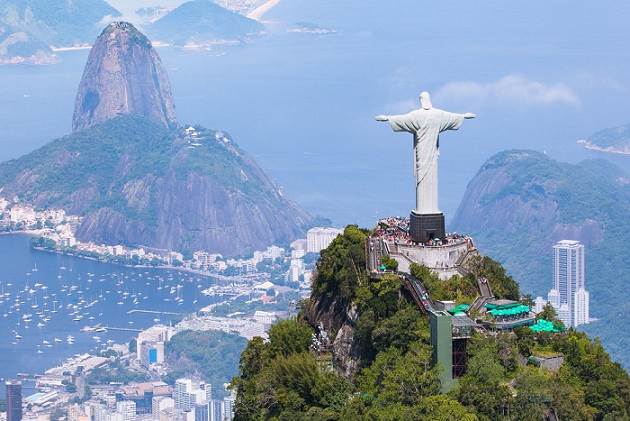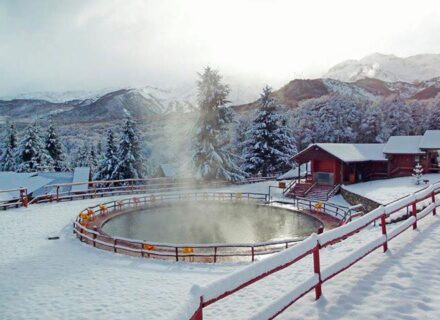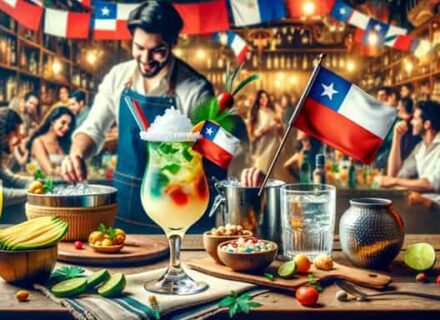Getting to Brazil
Brazil is located in South America, with the Atlantic Sea surrounding the coast. Brazil is the 5th largest nation in the world and borders all but two countries in South America. It shares borders with Bolivia, Argentina, French Guiana, Guyana, Paraguay, Suriname, Uruguay, Venezuela, Colombia and Peru.
- London to Rio de Janeiro is about a 12-hour flight
- Los Angeles to Rio de Janeiro takes around 15 hours
- Cape Town to Rio de Janeiro takes one day and 16.5 hours
- Sydney to Rio de Janeiro is about a 19.5-hour flight
- New York to Rio de Janeiro takes around 12.5 hours
Main airport
in Brazil
There are two main airports for international flights to Brazil. São Paulo Guarulhos International Airport (GRU) is located nearly 25 km from Sao Paulo city centre. Rio de Janeiro-Antonio Carlos Jobim International Airport (GIG), commonly called Galeao International Airport, is 20km north of downtown Rio.
Geography &
landscape of Brazil
Brazil has a vast, diverse landscape filled with dense forests, steamy jungles, rustic highlands, rugged hills and a stunning coastline. Home to the world’s most extensive wetlands, Pantanal, and what is commonly referred to as ‘the lungs of the world’, Brazil has some of the most incredible landscapes to explore. And it’s just as beautiful below the surface as it is above. Sparkling water, battered wreckages, vibrant coral reefs and an abundant marine life.
Culture, religion
and etiquette
Roman Catholicism is the predominant religion in Brazil with around 65% of the population following the faith. The Portuguese introduced Roman Catholicism to the country and inforced it as the unofficial state religion. The Catholic church still has a considerable influence on Brazil today.
8% of the population are either agnostic or atheist, but the number is steadily growing. Nearly 7% of the population practice Orthodox Christianity such as Jehovah’s Witness or Mormonism, and 6.5% of the population belong to the Assemblies of God, a Pentecostal sector of Christianity. The other minority religions in Brazil include Buddhism, Islam, Hinduism, Baha’i and Judaism.
The culture of Brazil is a wonderful mix of indigenous jungle tribes and modern, cosmopolitan families. For the majority of Brazilians, family is one of the most important cultural values. Children are very close with their parents, often living at home until they marry. Marriages and weddings used to be a very religious event, but in recent years, especially in the more urban areas, civil marriages are becoming increasingly common.
You’ll find that most Brazilians are kind, welcoming and very friendly. It’s not uncommon to be invited to their homes, and if asked, it is custom to bring a small gift, usually flowers. Brazilian’s generally dress in a western-style. Their casual attire tends to be much more formal and glamorous than in other South American countries. It’s usually safe to assume a preference of overdressing than underdressing in Brazil.
Top tip!
It is usually seen as impolite to eat food with your hands. Even with fruit, most people will prefer you to use a knife.
Languages spoken in Brazil
The most predominant language in Brazil is Portuguese, spoken by 99% of the population. Many people think that the presiding language over South America is Spanish, but, thanks to the sheer size and population of Brazil, it’s actually Portuguese. Other languages spoken in Brazil are Japanese, Spanish, Dutch, Vlax Romani and over 270 indigenous languages.
You might find that some locals, especially those working in the tourism industry, will be able to speak a little English, but outside of Rio de Janeiro and São Paulo, not many people will. We strongly advise you to learn a few key phrases in Portuguese. However, if your thinking of joining a group tour to Brazil, you’ll have an expert tour-leader on hand to speak Portuguese on your behalf.
Capital city of Brazil
Brasilia
The capital city of Brazil is Brasilia. Being only founded in 1960, it’s still a relatively young city. Brasilia is in the central-west part of brazil, in the Highlands. Having nearly three million residents, Brasilia is the 4th largest city in terms of population. With popular attractions, a beautiful park complete with a waterfall, a theatre, a national park and a cracking nightlife, there’s lots of reasons to visit the capital of Brazil.
Visas for Brazil
Some nationalities will require a visa to enter Brazil. You’ll need to arrange a visa well in advance if you are from US, Canada and Australia, as you will not be able to obtain one on arrival. In 2018, Brazil issued an e-visa system for the US, Canada, Australia and Japan which costs $40. Those from the UK, New Zealand, France and Germany do not need a visa to visit. You can check specific requirements for your nationality with the Brazilian embassy in your country.
Upon entry in Brazil, you will receive an entry/exit card. Keep hold of this as you will need to hand it back to the immigration officials upon leaving.
Vaccinations & travel health
The CDC and the WHO advise for the following routine vaccinations to be up to date when visiting Brazil: Measles, Mumps & Rubella (MMR), Tetanus, Diphtheria & Pertussis (TDAP), Chickenpox, Shingles, Pneumonia, Influenza, Meningitis and Polio. They also recommend the following vaccinations for travel to Brazil: Hepatitis A, Hepatitis B, Typhoid, Yellow Fever and Rabies.
Brazil does have a risk of malaria, especially in the Amazon regions and in Amapa. Iguazu Falls, Fortaleza, Rio de Janeiro, Sao Paulo and Belem have a relatively low risk of malaria. Malaria precautions are essential no matter where you travel to in Brazil. Please consult your travel doctor well in advance to discuss your options and make any necessary arrangements.
Is it safe to drink tap water in Brazil?
Generally speaking, the tap water in Brazil is safe to drink. However, most Brazilians stick to bottled water as the taste isn’t too great.
Electricity and plugs in Brazil
The plugs and sockets in Brazil are type C and N. A type C plug has two round prongs, and a type N plug has two round prongs and a grounding pin. The standard voltage is 127/220V, and the frequency is 60 Hz.
Emergency calls
We always advise for our passengers have a few essential numbers saved in case of emergencies. The most important ones to note in Brazil are:
190 – Emergency Police service
197 – Police enquiries
192 – Ambulance service
193 – Fire service
Travelling as a single woman in Brazil
Brazilian people are typically very friendly, relaxed and welcoming. Even more so if you can speak a few words of Portuguese. It is not uncommon to be invited in with open arms like you were an old family friend.
Brazil is a country of romance, and as such, if you are a single woman, you will most likely receive your fair share of wolf-whistles, advances and suggestive looks. In Brazil, a friendly smile and a little eye contact will probably be interpreted as a flirtation, so if you aren’t interested, it’s best to leave them alone completely.
One of the biggest questions people have about Brazil is, is it safe? As with many places, certain areas of Brazil are safer than others. The country does have problems with large scale poverty and high crime rates in certain territories, so it’s a good idea to do your research first. Theft is a particular problem around the tourist areas, so be especially careful of your belongings and never flash your cash. Another prime place for theft is during Rio Carnival. Only take with you what you need to and leave all valuables at your hotel/guest house.
Wifi and internet access in Brazil
Brazil is generally very well connected, and you’ll find that most hotels, hostels and guest houses will provide free wifi. In towns and cities, you’ll usually find that restaurants, bars and cafes will also provide free wifi. Brazil did used to have a big internet cafe culture, but these days they’re quite hard to come by.
Time zone in Brazil
Brasilia is 3 hours behind London (GMT), 5 hours ahead of Los Angeles (PDT) and 2 hours ahead of New York (EST). Due to the large surface area it occupies, Brazil actually covers four time zones – UTC-2, UTC-3, UTC-4 and UTC-5. To calculate the time difference from your current location, visit timeanddate.com.
Getting around Brazil
Aeroplane
As with any country as large as Brazil, there are a lot of options for domestic flying. Every city has airport and every town has a landing strip. You can travel almost anywhere in Brazil by air. Prices do however vary greatly for flights within Brazil. In the South and Northeast, costs are relatively reasonable. However, flights from Rio de Janeiro, San Paulo and anywhere near the Amazon, tend to be extremely high.
Bus
Buses are a popular, budget-friendly way to travel around Brazil. The journey may not be the smoothest, you might break down, but the network is excellent so you will get there, eventually. The main downside of travelling by bus is usually the length. A lot of journeys are well over 24 hours, so it isn’t the best option if you’re on a tight schedule.
Taxi
Taxis are generally a popular way to travel within the towns and cities of Brazil. Taxis within cities operate using a meter, at a price per km, but in the more rural areas, you will need to negotiate a price upfront. Always make sure you get into a licenced taxi.
Metro/Subway
Some of Brazil’s main cities such as Rio and Sao Paulo have fantastic metro systems which cost around R$3.50 per journey. All metros in Brazil only operate during the day.
History of Brazil
Until the arrival of European settlers, Brazil was occupied by hundreds of indigenous tribes. Unfortunately not many left much behind so we know very little about them, even today. In 1500, the Portuguese arrived and began taking over the country. The Portuguese settlers imported African slaves to work in sugar plantations – this became Brazil’s largest export business. The Portuguese continued to conquer the land through various battles and eventually took Rio de Janeiro and many other Dutch and British colonised areas.
In 1807, the Portuguese royals came to Brazil while fleeing Napoleon. The King’s son became Brazil’s emperor in 1821, and only a year later, he declared Brazil independent. After the emperor was taken over by Deodoro Da Fonseca, Brazil had a succession of elected presidents and military coups. In 2011, Dilma Vana Rousseff became the first woman president.


